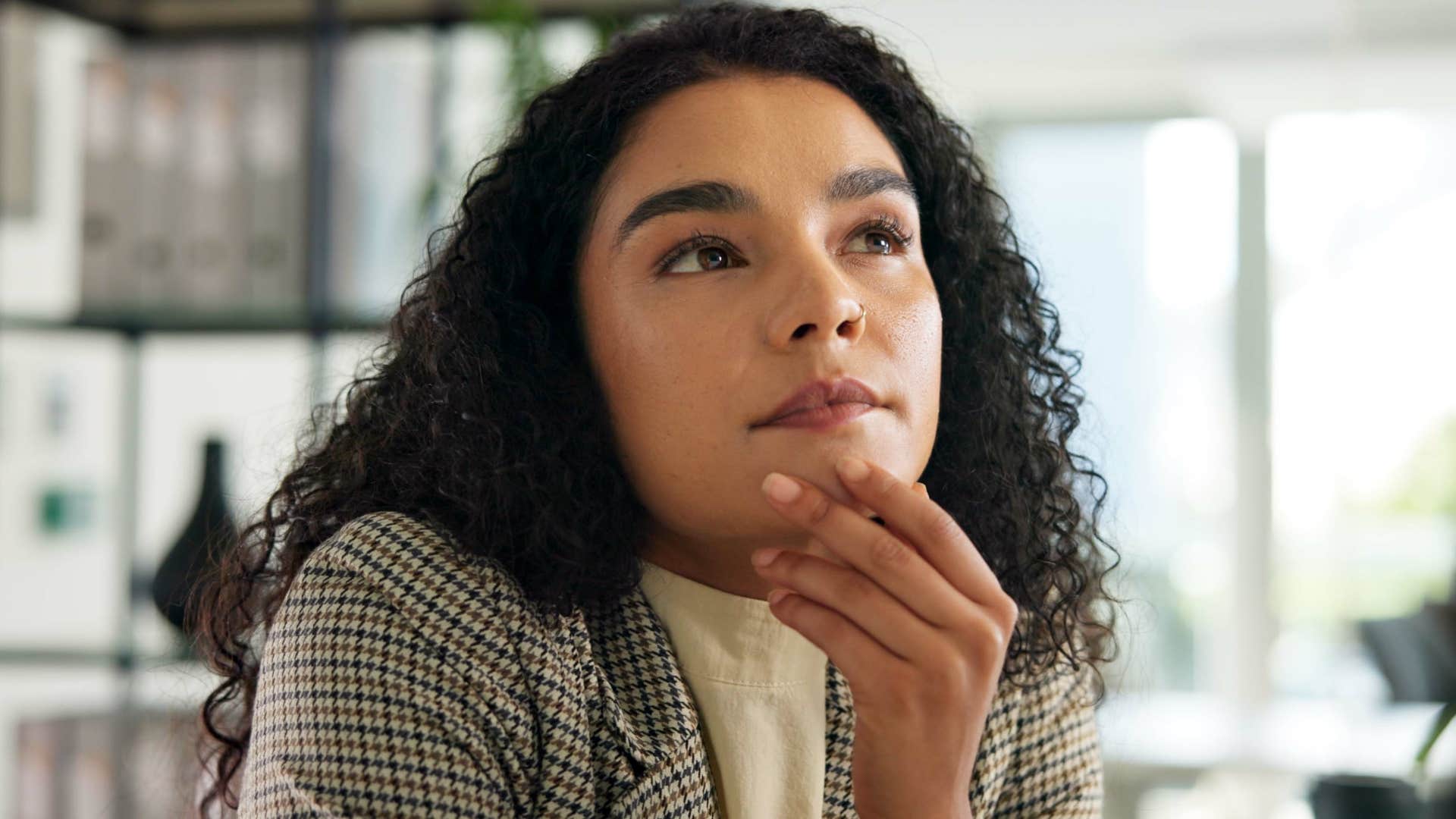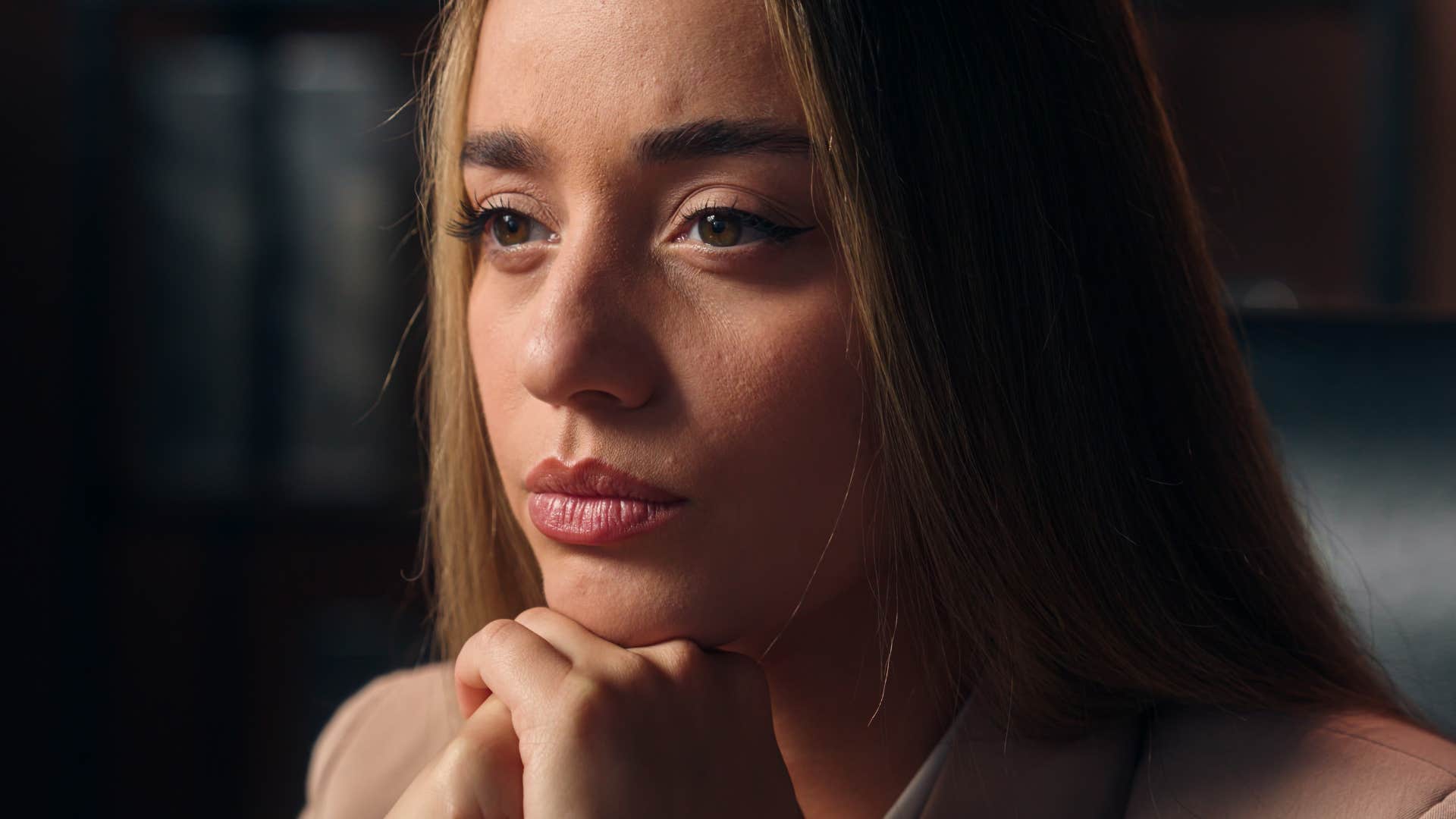People Who Constantly Imagine The Worst Case Scenario Usually Have These 11 Brilliant Personality Traits
They're skilled enough to consider tough situations, but still remain calm.
 mkfilm | Shutterstock
mkfilm | Shutterstock While dwelling constantly on worst-case scenarios and “catastrophizing” about daily decisions can sometimes amplify emotional turmoil and physical distress, it also often gives space for people to make informed decisions and stand up for themselves when it’s used productively. With the right boundaries and thoughtful interpretations, thinking deeply about outcomes and potential consequences before making decisions is a powerful skill.
Of course, ruminating and catastrophic thinking can sometimes be rooted in childhood trauma, but people who constantly imagine the worst-case scenario usually have brilliant personality traits, too. They’re grounded, deep thinkers who don’t simply accept truths and make decisions without giving them the time, effort, and thought they need to thrive.
People who constantly imagine the worst case scenario usually have these 11 brilliant personality traits
1. They’re intuitive
 PeopleImages | Shutterstock
PeopleImages | Shutterstock
From noticing when people are left out of a conversation to leaning on their gut instincts to guide their decisions, people who constantly imagine the worst-case scenario usually have these brilliant personality traits. Even though it takes a lot of practice to trust and appreciate their internal intuition, it tends to subconsciously guide them in every aspect of their lives.
Sometimes, even holding space for “peculiar” beliefs and perspectives outside of the ordinary is also associated with this kind of intuition, according to a study from Personality and Individual Differences, giving people the chance to consider unique outcomes and information before making a decision.
2. They’re future-oriented
 Ground Picture | Shutterstock
Ground Picture | Shutterstock
Even when they’re present in the moment or considering the past, people who are constantly imagining the worst-case scenario are mostly future-oriented. They are several steps ahead of everyone else, so they can predict what will happen and offer solutions before things take a turn for the worse.
Whether it’s in the workplace, making plans for a new project, or planning for the future with their partners at home, they’re thinking in the big picture, being careful about considering how their decisions today will impact them down the road.
3. They’re realistic
 MAYA LAB | Shutterstock
MAYA LAB | Shutterstock
According to a study from Personality and Social Psychology Bulletin, being a “realist” isn’t rooted in pessimism nor optimism, but rather a blend of both. Especially in high-stress situations and anxiety-inducing conflicts, they’re not trying to be inauthentically positive, but confident and realistic.
They may always be thinking about the worst-case scenario, but they’re intentional about communicating those thoughts to others at the right time and place. It’s this kind of realism that people tend to admire and appreciate — often making good leaders in a variety of situations.
4. They’re problem-solvers
 fizkes | Shutterstock
fizkes | Shutterstock
People who constantly imagine the worst-case scenario usually have brilliant personality traits like problem-solving. They’re not only intuitive and emotionally conscious, but they also have the skills to think deeply and solve problems with the big picture in mind.
Not only do problem-solving skills often ensure people make good leaders in the workplace, but they also add value and security to personal routines and relationships. If you can think deeply, regulate your emotions, and consider the worst-case scenarios without letting them take over your well-being, you’re set up to make informed decisions that serve in your best interest.
5. They’re resilient
 Lightfield Studios | Shutterstock
Lightfield Studios | Shutterstock
Dealing with adversity and going through a lot in life often makes people more resilient and strong-willed. They know what it takes to get through hardship and often use lessons from tough times to make decisions in their present circumstances.
People who constantly imagine the worst-case scenario have probably lived through it before, so they understand the importance of considering it and regulating their own emotions to make decisions that protect them from harm.
6. They’re compassionate
 PeopleImages | Shutterstock
PeopleImages | Shutterstock
Compassion is often interlinked with strong social skills and emotional intelligence. The more compassionate you are, the more likely you are to cultivate healthy relationships, prosocial behaviors, and a secure sense of personal well-being.
Even if it seems counterintuitive, people who consider the worst-case scenario often do so for the sake of protecting themselves and others. As long as they have a solid foundation of emotional regulation skills when considering these events, they’re likely to craft decisions and safe spaces for communication that better support everyone in their lives.
7. They’re creative thinkers
 Tiantip Deedet | Shutterstock
Tiantip Deedet | Shutterstock
To be a highly creative person, you also have to have skills like adaptability, resourcefulness, and innovative thinking. That’s why people who constantly imagine the worst-case scenario when making decisions are often innately creative — they’re thinking outside of the box and considering things that the average person may blissfully ignore or overlook.
Even if it’s not painting or drawing a picture, their creativity shines through in many aspects of their daily lives. Whether it’s the workplace or resolving a conflict with a friend, they know how to consider the big picture, regulate their own emotions, and craft an innovative solution that makes everyone feel more secure, safe, and empowered.
8. They’re dependable
 Inside Creative House | Shutterstock
Inside Creative House | Shutterstock
If you have a friend who’s always considering the worst-case scenario, chances are you’re always going to them for advice, support, or security. They’re dependable and reliable at heart, even if it means making themselves a little bit uncomfortable in the moment to secure the safety of their friends and loved ones.
Many intrinsically avoidant people may avoid the deep thinking habits that these individuals promote for their own comfort, but a person who imagines in the worst-case scenario isn’t usually doing it for themselves, but for their loved ones, partners, and peers.
9. They’re regulated
 PeopleImages | Shutterstock
PeopleImages | Shutterstock
If it’s not already clear, a person who is always thinking about the worst-case scenario is also probably the most emotionally regulated and dependable in any room. Not only do they already practice regulating their feelings and emotions when considering these situations, but when they’re actually in the room when things take a turn for the worse, they’re prepared to handle it.
Of course, building this kind of emotional intelligence and a firm foundation of regulation skills isn’t an easy task — it takes discipline and intention. But if you’re willing to grow, lean into discomfort, and unlearn your avoidant tendencies, you could also boast the emotional regulation that calm, cool, and collected leaders do.
10. They’re introspective
 PeopleImages | Shutterstock
PeopleImages | Shutterstock
From self-reflection when they’re alone to finding space for personal thought in groups, people who constantly imagine the worst-case scenario usually have these brilliant, introspective personality traits.
That’s why introspective habits and rituals are the most commonly pressured onto people dealing with stress and emotional turmoil, like a study from Healthcare explains. Struggling individuals who are yearning for coping mechanisms without truly understanding the root cause or experience of their emotions may lean on negative escapism.
However, introspective and mindful people address their emotions without running away. They’re not afraid to lean into the discomfort of their own thoughts and to acknowledge their complex emotions as they come to the surface — hence, imagining the worst-case scenario and being able to use that information healthily.
11. They’re subtly brave
 PeopleImages | Shutterstock
PeopleImages | Shutterstock
Even if they’re dealing with quiet fear or anxiety in the background, imagining the worst-case scenario in any given room, these individuals still show up with a brave face. They’re intentional leaders who care more about making thoughtful decisions and making other people safe than protecting their own comfort or remaining innocent with blissful ignorance.
They’re brave enough to consider hard topics and to regulate themselves through them, but they’re also not afraid to bear the burden of communicating them when the time is right.
Zayda Slabbekoorn is a senior editorial strategist with a bachelor’s degree in social relations & policy and gender studies who focuses on psychology, relationships, self-help, and human interest stories.

